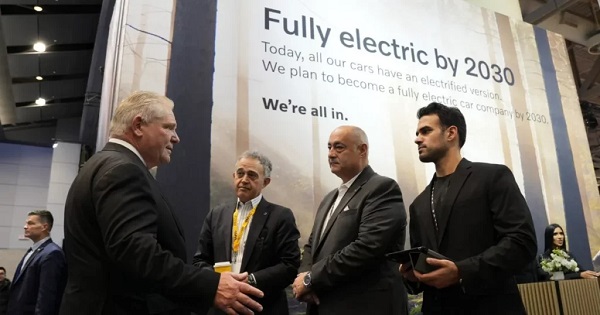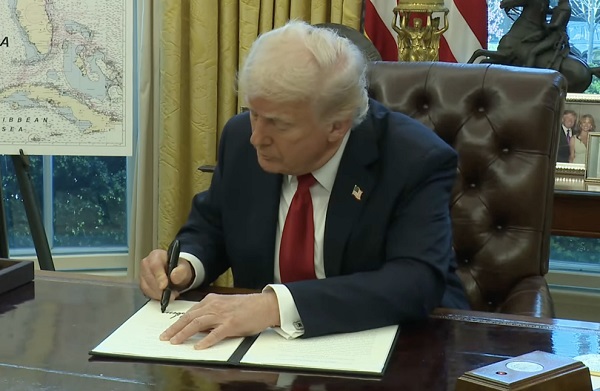Business
Doug Ford needs to ditch the net-zero pipedreams

 Dan McTeague
Dan McTeague
Congratulations are in order for Doug Ford, newly re-elected in Ontario to his third consecutive majority government. As a proud Ontarian myself, I wish Premier Ford great success, which will ultimately be measured not by how many votes he’s won, but by the quality of the policies he implements and how well he responds to the challenges which arise on his watch.
Of course, the two are related. Bad policy can instigate a crisis. And bad policy in the midst of one often transforms a challenge into a catastrophe. Just one instructive example: Remember that in the wake of the Stock Market Crash of 1929, President Herbert Hoover signed into law the Smoot-Hawley Tariff, which, as John Robson recently observed on Twitter/X, helped turn “a painful short-term correction into an agonizing decade of misery.”
That is a moment in history our American friends would do well to remember just now. Though Donald Trump has been crowing about the economic benefits of tariffs for decades, the historical record tells a different story. And, more importantly for us, no matter how much damage Trump’s tariffs do to the American economy, they will be worse for Canada.
This is a moment in which our country is in desperate need of political leadership. That isn’t going to come from Ottawa, where the Trudeau Liberals and their accomplices in the NDP have shuttered parliament for months so that they can hold a coronation for their fellow Green Elitist, Mark Carney, who is all set to double-down on the disastrous net-zero policies of his predecessor.
So we are going to have to rely, at least in the near term, on our premiers to respond to this crisis. And so far very few of them – the notable exception being Danielle Smith – have shown the kind of ingenuity and resilience we need at this moment.
Ford himself has done everything he can to make himself the face of Canada’s response to the tariff threat. He’s made a great show of removing (already purchased) American-made products from LCBO.’s shelves, he has pledged to put a 25% export tax on energy, and he’s threatened to cut off Ontario’s energy exports to the United States entirely. In defense of the latter, Ford said, “They want to come at us hard, we’re going to come back twice as hard.”
That might sound impressive, but unfortunately Canada lacks the economic capacity to “come back twice as hard.” Years of mismanagement, on the federal, provincial, and even municipal levels, have left us in a terrible position to negotiate with the world’s largest economy. We have taken every opportunity to shoot ourselves in the foot, chasing foolish net-zero pipedreams which have succeeded only in squandering our capital, and smothering the oil and gas industry upon which our prosperity relies.
Justin Trudeau and his cronies deserve a lot of the blame for that, but the Ford government deserves its share as well. Ford long ago drank the net-zero kool-aid. He embraced the so-called “green energy transition” to such an extent that his government renamed its energy ministry the ‘Ministry of Energy and Electrification,’ a nod to the idea that we need to move away from fossil fuels and embrace electrically-powered everything. Neglecting to mention, of course, where that electricity is going to come from. (Hint: it’s not from expensive and inefficient wind and solar projects! Which, by the way, Ford has also invested heavily in.) And, relatedly, he’s stated that he will not be happy until Ontario achieves a 100% zero-carbon electricity grid, moving away from affordable and reliable natural gas as an energy source.
On top of that, Ford has gone “all in” on electric vehicles, teaming up with Trudeau to invest tens-of-billions of taxpayer dollars in a bid to attract EV manufacturing to his province. This investment wasn’t looking so hot before Trump’s election – remember when the Ford Motor Company scrapped their plan to build EVs at their plant in Oakville, Ont, due to “an unexpected slowdown” in demand for battery powered cars? And it has looked much worse since, once Trump got to work repealing the Biden administration’s de facto EV mandate.
Without that mandate, there will be a few hundred million fewer potential EV buyers in the world. People aren’t exactly lining up to buy EVs if they don’t have to. And though Trudeau’s 2035 EV mandate is still in place, even the Canadian market is softer than expected, especially after the federal program subsidizing the purchase of EVs – to the tune of $5,000 a piece – ran out of money and ended abruptly earlier this year.
But despite the changed environment, Ford doubled down on his commitment to EVs during the campaign. His platform read, “A re-elected PC government would continue to make these investments regardless of any decision by the U.S.,” and Ford continually reaffirmed his intention to continue to “invest in the sector.”
This is worse than rearranging the deck chairs on the Titanic. It’s closer to setting fire to the few lifeboats the ship actually has.
Ontario’s voters have once again entrusted our province to Doug Ford. But if he doesn’t start taking this crisis seriously – by shoring up the province’s financial situation and increasing our competitiveness by changing course on EVs and kicking net-zero to the curb – he won’t be remembered as the first premier to win three consecutive majorities in over 60 years. Instead he’ll be remembered as the guy who took Ontario past the point of no return.
Dan McTeague is the president of Canadians for Affordable Energy and a former Liberal member of Parliament.
Business
Musk Slashes DOGE Savings Forecast By 85%


From the Daily Caller News Foundation
By Thomas English
Elon Musk announced Thursday that the Department of Government Efficiency (DOGE) is now targeting $150 billion in federal savings for fiscal year 2026 — dramatically scaling back earlier claims of slashing as much as $2 trillion.
Musk initially projected DOGE would deliver $2 trillion in savings by targeting government waste, fraud and abuse. That figure was halved to $1 trillion earlier this year, but Musk walked it back again at Thursday’s Cabinet meeting, saying the revised $150 billion projection will “result in better services for the American people” and ensure federal spending “in a way that is sensible and fair and good.”
“I’m excited to announce we anticipate saving in FY ’26 from a reduction of waste and fraud a reduction of $150 billion dollars,” Musk said. “And some of it is just absurd, like, people getting unemployment insurance who haven’t been born yet. I mean, I think anyone can appreciate — I mean, come on, that’s just crazy.”
The announcement marks the latest in a string of revised projections from Musk, who has become the face of President Donald Trump’s aggressive federal efficiency agenda.
“Your people are fantastic,” the president responded. “In fact, hopefully they’ll stay around for the long haul. We’d like to keep as many as we can. They’re great — smart, sharp, finding things that nobody would have thought of.”
Musk originally floated the $2 trillion figure during campaign appearances last fall.
“I think we could do at least $2 trillion,” Musk said at the Madison Square Garden campaign rally in November. “At the end of the day, you’re being taxed — all government spending is taxation … Your money is being wasted, and the Department of Government Efficiency is going to fix that.”
By January, he softened expectations to a “really quite achievable” $1 trillion target before downsizing that figure again this week.
“Our goal is to reduce the deficit by a trillion dollars,” Musk told Fox News’ Bret Baier “Looked at in total federal spending, to drop the federal spending from $7 trillion to $6 trillion by eliminating waste, fraud and abuse … Which seems really quite achievable.”
DOGE’s website, which tracks cost-saving initiatives and contract cancellations, currently calculates total federal savings at $150 billion.
2025 Federal Election
Taxpayers urge federal party leaders to drop home sale reporting to CRA

Party leaders must clarify position on home equity tax
The Canadian Taxpayers Federation is calling on all party leaders to prove they’re against home equity taxes by pledging to immediately remove the Canada Revenue Agency reporting requirement on the sale of primary residences.
“Canadians rely on the sale of their homes to pay for their golden years,” said Carson Binda, CTF B.C. Director. “After the government spent hundreds of thousands of dollars flirting with home taxes, taxpayers need party leaders to prove they won’t tax our homes by removing the CRA reporting requirement.”
Right now, the profit you make from selling your home is exempt from the capital gains tax. However, in 2016, the federal government mandated that Canadians report the sale of their homes to the CRA, even though it’s tax exempt.
The Canada Mortgage and Housing Corporation also spent at least $450,000 to study and influence public opinion in favour of home equity taxes. The report recommended a home equity tax targeting the “housing wealth windfalls gained by many homeowners while they sleep and watch TV.”
“A home equity tax would hurt seniors saving for their golden years and make homes more expensive for younger generations,” Binda said. “If the federal government isn’t planning on imposing a home equity tax, then Canadians shouldn’t be forced to report the sale of their home to the CRA.”
-

 Alberta2 days ago
Alberta2 days agoAlberta takes big step towards shorter wait times and higher quality health care
-

 Business2 days ago
Business2 days agoStocks soar after Trump suspends tariffs
-

 COVID-192 days ago
COVID-192 days agoBiden Admin concealed report on earliest COVID cases from 2019
-

 2025 Federal Election1 day ago
2025 Federal Election1 day agoResearchers Link China’s Intelligence and Elite Influence Arms to B.C. Government, Liberal Party, and Trudeau-Appointed Senator
-

 Business2 days ago
Business2 days agoScott Bessent Says Trump’s Goal Was Always To Get Trading Partners To Table After Major Pause Announcement
-

 Energy2 days ago
Energy2 days agoTrump signs four executive orders promoting coal industry
-

 Business1 day ago
Business1 day agoTimeline: Panama Canal Politics, Policy, and Tensions
-

 COVID-191 day ago
COVID-191 day agoFauci, top COVID officials have criminal referral requests filed against them in 7 states






